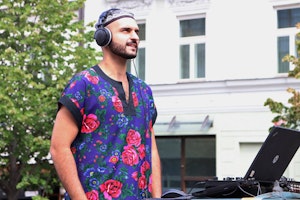Making Roma Rights Real in Ireland
By Bethany Wynne-Morgan
In November 2014, a mob numbering nearly 200 set out to target Roma families living in the area of Waterford, Ireland. Chanting “Roma out, out, out!” they smashed windows and kicked in doors, terrorizing the community’s Roma residents in an attempt to intimidate, frighten, and ultimately run them out of town.
They succeeded in doing just that. During the course of the riot, a number of Roma families had to be evacuated from their homes, including toddlers and elderly residents.
Sadly, this experience is not unique. Roma in Ireland are often subject to racism, ethnic profiling, and stereotyping. The Irish media routinely portrays and stigmatizes Roma as criminals. This discrimination has been well documented, in the Children’s Ombudsman’s Special Inquiry into the removal of two Roma children in 2013 and in our own report In from the Margins: Roma in Ireland [PDF].
In our research, we found that, as in many other European countries, the estimated 5,000 members of Ireland’s Roma community are an extremely marginalized group that faces significant barriers to accessing their rights. Many find it difficult to gain employment, while others report discrimination when trying to access housing and services such as social welfare, education, and health care. Even everyday tasks like shopping can be fraught with indignity and hardship, as many Roma are routinely refused entry to shops in cities like Dublin and Cork.
Our report found that a staggering 100 percent of the research participants stated that they had felt discriminated against, harassed, or victimized when interacting with state institutions.
One of the most worrying aspects of the Waterford case is how quickly the online commentary on social media escalated into organized, racially motivated hate speech. In the weeks leading up to the night of the violence, a number of Facebook pages openly demanded the removal of Roma. Pages with titles like “Get Them Out of Town” perpetuated misinformation and directed dehumanizing language at the community.
The impact of this discrimination cannot be overstated. Instances such as these highlight the need for collective action to combat stereotypes, and to foster a greater understanding of Romani culture and identity.
Since its inception in 2000, Nasc, the Irish Immigrant Support Centre, has been working closely with the Roma community in Cork. Our free legal service provides advocacy primarily around employment and social protections. It is through this work that we have identified clear patterns of discrimination and significant barriers Roma face in accessing their rights.
In addition to this service provision, Nasc is working directly with a number of community leaders to establish a grassroots movement to challenge discrimination on a local and national level. The aim is to build and support the capacity of the community through leadership and communications training. The development of strong and credible Roma voices is important in addressing and countering the culture of discrimination.
In collaboration with the strategic casework and advocacy from the legal clinic at Nasc, the role of the community activists is to strengthen communications and lobbying activities in order to tackle the wider institutional cultures of discrimination and policy frameworks that operate to perpetuate the structural discrimination of Roma in Ireland.
We also work to promote positive images of Roma in Ireland to counter negative stereotypes. In 2012, Nasc supported Roma activist Greucean Adam and filmmaker Brian Cronin to produce the short documentary film Roma—From Huedin to Here, which explored the story of the Roma community in Cork and their journey from a small camp in Romania to a new life in Ireland.
The film was viewed by 200 people in the main cinema in Cork. Additional screenings at local film festivals and events have been well attended. We believe these screenings are important in engaging the public and fostering a greater understanding of the community.
Structural discrimination against the Roma came sharply into focus recently in the well-documented case of two Roma children who were taken into care by the state. The children were taken solely on the grounds that they were blond and blue-eyed and did not share their parents’ physical characteristics.
Following the resolution of the case, the state commissioned the Children’s Ombudsman to conduct an independent investigation into the incident, and the resulting report faulted An Garda Síochána (Ireland’s police force) and the media for ethnic profiling. As a result of the investigation, the government committed to addressing the situation of the Roma in Ireland, in particular by improving relations between An Garda Síochána and the Roma, and tackling ethnic profiling.
To address the structural discrimination of the Roma community, Nasc, in collaboration with Cork Community Policing and the Garda Racial, Intercultural, and Diversity Office, conducted two antiracism trainings with 50 Gardaí last year. The trainings addressed issues of ethnic profiling and provided an opportunity for members of the Roma community to speak directly about issues affecting them.
Supporting key Roma activists as they engage in this process is a first step towards rebuilding the damaged relationships between the community and the police. It will also further the longer-term outcome of bringing about measures to outlaw ethnic profiling.
With the government committed to implementing measures that effectively address the situation for Roma in Ireland, there is now a unique opportunity to capitalize on this commitment and to effect positive systemic change to state policy and practice that negatively impacts the Roma community. Our new project supported by the Open Society Foundations, Making Roma Rights Real, is at the forefront of this progress, and vindicates the rights of Roma in Ireland while building the capacities of Roma activists to realize their own rights and speak with powerful voices.
Nasc, the Irish Immigrant Support Centre, is a grantee of the Open Society Foundations.
Bethany Wynne-Morgan is a Roma rights officer with Nasc, the Irish Immigrant Support Centre.


